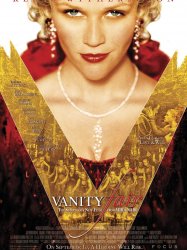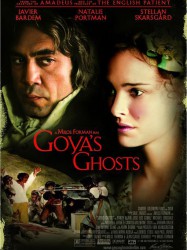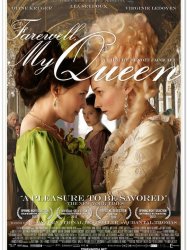Films with theme "French Revolution films", sorted by revenue

Mr. Peabody & Sherman (2014)
, 1h32Directed by Rob Minkoff
Origin USA
Genres Comedy, Adventure, Animation, Comic science fiction
Themes Films set in Africa, Films about animals, Films about children, Time travel films, Comedy science fiction films, Films about dogs, Political films, Buddy films, Children's films, Mise en scène d'un mammifère, French Revolution films
Actors Ty Burrell, Max Charles, Ellie Kemper, Ariel Winter, Stephen Colbert, Allison Janney
Mr. Peabody is a gifted anthropomorphic dog who has an adopted 7-year-old son, Sherman. He tutors Sherman travelling throughout history using the WABAC, a time machine.
 , 2h18
, 2h18Directed by Peter Weir
Origin USA
Genres Drama, War, Action, Adventure, Historical
Themes Films about anarchism, Seafaring films, Transport films, Political films, Children's films, Histoire de France, Napoleonic Wars films, French Revolution films
Actors Russell Crowe, Paul Bettany, Billy Boyd, James D'Arcy, Edward Woodall, Max Pirkis
The film takes place in May of 1805, during the Napoleonic Wars. Captain "Lucky Jack" Aubrey of HMS Surprise is ordered to pursue the French privateer Acheron, and "Sink, Burn, or take her as a Prize." As the film opens, the British warship is ambushed by Acheron; Surprise is heavily damaged, while its own cannon fire does not penetrate the enemy ship's hull. Using smaller boats, the crew of Surprise tow the ship into a fog bank and evade pursuit. Aubrey learns from a crewman who saw Acheron being built that it is heavier and faster than Surprise, and the senior officers consider the ship out of their class. Aubrey notes that such a ship could tip the balance of power in Napoleon's favour if allowed to plunder the British whaling fleet at will. He orders pursuit of Acheron, rather than returning to port for repairs. Acheron again ambushes Surprise, but Aubrey slips away in the night by using a clever decoy buoy and ships lamps.

The Brothers Grimm (2005)
, 1h58Directed by Terry Gilliam
Origin USA
Genres Thriller, Fantastic, Comedy, Fantasy, Action, Adventure
Themes Films about animals, Inspiré de l'univers des contes et légendes, Films about magic and magicians, Wolves in film, Werewolves in film, Witches in film, Political films, Children's films, Mise en scène d'un mammifère, Napoleonic Wars films, French Revolution films, Films about royalty
Actors Matt Damon, Heath Ledger, Peter Stormare, Monica Bellucci, Lena Headey, Jonathan Pryce
Wilhelm Grimm (Matt Damon) and Jakob Grimm (Heath Ledger) arrive in French-occupied Germany during the early 1800s. They go to Karlstadt to rid the town of a witch's ghost. After killing the "ghost", it is revealed that the Brothers Grimm have actually set up a fake witch to trick the town. Afterwards, as they are celebrating, Italian torturer Mercurio Cavaldi (Peter Stormare) takes them to the French General Delatombe (Jonathan Pryce). Delatombe forces them to solve a mystery: The girls of the small village of Marbaden are disappearing, and the villagers are convinced that supernatural beings are responsible. The Grimms are charged with finding who is responsible, and they soon discover that it is the work of a real supernatural force: a beautiful, yet evil, 500-year-old Thuringian Queen (Monica Bellucci) stealing young girls to restore her own beauty. Will and Jake have a complicated relationship; Jake is the smaller, younger, more sensitive one that Will feels he needs to protect. Will is often very hard on Jake (dating all the way back to their childhood, when Jake spent their money that was to be used for medicine for their dying sister on "magic beans") and orders him around. Will is somewhat of a womanizer and wants to make money, whereas Jake is more interested in fairy tales and adventures. Jake feels that Will doesn't care about or believe in him; but Will is just frustrated about the way Jake acts so spontaneously, making it hard for Will to protect him.

Brotherhood of the Wolf (2001)
, 2h22Directed by Christophe Gans
Origin France
Genres Drama, Science fiction, Thriller, Martial arts, Action, Adventure, Horror, Historical, Martial arts
Themes Films about animals, Films about families, Films about sexuality, Sports films, Rape in fiction, Martial arts films, Wolves in film, Political films, Kung fu films, Mise en scène d'un mammifère, Histoire de France, French Revolution films
Actors Samuel Le Bihan, Vincent Cassel, Émilie Dequenne, Monica Bellucci, Jérémie Rénier, Marc Dacascos
The film begins during the French Revolution, with the aged Marquis d'Apcher as the narrator, writing his memoirs in a castle, while the voices of a mob can be heard from outside. The film flashes back to 1764, when a mysterious beast terrorized the province of Gévaudan and nearby lands.

Marie Antoinette (2006)
, 2h3Directed by Sofia Coppola
Origin USA
Genres Drama, Biography, Comedy-drama, Historical, Romance
Themes Feminist films, Politique, Marie-Antoinette, Political films, Histoire de France, French Revolution films, Films about royalty
Actors Kirsten Dunst, Jason Schwartzman, Judy Davis, Rip Torn, Rose Byrne, Asia Argento
Fourteen-year-old Maria Antonia Josephina Johanna Habsburg (Kirsten Dunst) is the beautiful, charming, and naive archduchess of Austria, youngest of Empress Maria Theresa's (Marianne Faithfull) daughters. In 1770, the only one left unmarried among her sisters, she is sent by her mother to marry the Dauphin of France, the future Louis XVI of France (Jason Schwartzman), to seal an alliance between the two rival countries. Marie Antoinette travels to France, relinquishing all connections with her home country, including her pet Pug "Mops", and meets the King Louis XV of France (Rip Torn) and her future husband, Louis Auguste. The two arrive at the Palace of Versailles, which was built by the King's great-grandfather. They are married at once, and are encouraged to produce an heir to the throne as soon as possible; but the next day it is reported to the king that "nothing happened" on the wedding night.

Royal Affairs in Versailles (1954)
, 2h45Directed by Sacha Guitry
Origin France
Genres Drama, Comedy, Historical
Themes Politique, Political films, Histoire de France, French Revolution films, Films about royalty
Actors Georges Marchal, Michel Auclair, Claudette Colbert, Gaston Rey, Jean Marais, Louis Arbessier
Historical human stories in connection with the Royal Palace, the Chateau of Versailles.

History of the World: Part I (1981)
, 1h32Directed by Mel Brooks, Brian W. Cook
Origin USA
Genres Comedy, Musical theatre, Musical
Themes Films set in Africa, La préhistoire, Films about religion, Musical films, Portrayals of Jesus in film, Children's films, Histoire de France, French Revolution films
Actors Dom DeLuise, Madeline Kahn, Cloris Leachman, Mel Brooks, Harvey Korman, Gregory Hines
The film is a parody of the historical spectacular film genre anthology, including the sword and sandal epic and the period costume drama subgenres. The four main segments consist of stories set during the Stone Age, the Roman Empire, the Spanish Inquisition, and the French Revolution. Other intermediate skits include reenactments of the giving of the Ten Commandments and the Last Supper.

Love and Death (1975)
, 1h25Directed by Woody Allen
Origin USA
Genres War, Comedy, Historical
Themes Political films, Histoire de France, Napoleonic Wars films, French Revolution films
Actors Woody Allen, Diane Keaton, Jessica Harper, Georges Adet, Olga Georges-Picot, James Tolkan
When Napoleon (James Tolkan) invades Austria during the Napoleonic Wars, Boris Grushenko (Woody Allen), a coward and pacifist scholar, is forced to enlist in the Russian Army. Desperate and disappointed after hearing the news that Sonja (Diane Keaton), his cousin twice removed, is to wed a herring merchant, he inadvertently becomes a war hero. He returns and marries the recently widowed Sonja, who does not want to marry Boris, but promises him that she will when she thinks that he is about to be killed in a duel. Their marriage is filled with philosophical debates, and no money. Their life together is interrupted when Napoleon invades the Russian Empire. Boris wants to flee but his wife, angered that the invasion will interfere with their plans to start a family that year, conceives a plot to assassinate Napoleon at his headquarters in Moscow. Boris and Sonja debate the matter with some degree of philosophical double-talk, and Boris reluctantly goes along with it. They fail to kill Napoleon and Sonja escapes arrest while Boris is executed, despite being told by a vision that he will be pardoned.

The Visitors: Bastille Day (2016)
, 1h50Directed by Jean-Marie Poiré
Origin France
Genres Comedy, Fantasy
Themes Time travel films, Histoire de France, French Revolution films
Actors Christian Clavier, Jean Reno, Marie-Anne Chazel, Valérie Lemercier, Franck Dubosc, Karin Viard
Arrivés en 1793, en pleine Révolution française, Godefroy de Montmirail et son écuyer Jacquouille la Fripouille rencontrent Jacquouillet, descendant de Jacquouille et accusateur public, et se retrouvent empêtrés dans la tourmente de la Terreur. Godefroy est confronté à sa descendance de l'époque, qui essaie d'échapper à la Révolution : lui et son écuyer les aident à fuir et tentent de retrouver un descendant de l'Enchanteur pour rentrer à leur époque. Les deux voyageurs temporels subissent en effet des effets secondaires inquiétants dus aux couloirs du temps non refermés.

Vanity Fair (2004)
, 2h22Directed by Mira Nair
Origin USA
Genres Drama, Comedy-drama, Romantic drama, Romance
Themes Films about children, Political films, Napoleonic Wars films, French Revolution films
Actors Reese Witherspoon, Jonathan Rhys-Meyers, James Purefoy, Angelica Mandy, Gabriel Byrne, Eileen Atkins
1802, London. The mysterious Lord Steyne (Gabriel Byrne) goes to a painter's studio where he has agreed to buy a painting of a young woman. The young Rebecca "Becky" Sharp (Angelica Mandy), then a girl of ten, insists on having ten guineas, instead of four guineas, as the price of the painting. The painter explains that the model in the painting is Becky's mother, the painter's late wife. Steyne agrees to pay the higher amount and leaves with the painting. The young Becky is seen moving to Miss Pinkerton's Academy for Young Ladies after her father's death.

War and Peace (1956)
, 3h28Directed by King Vidor, Bernard Vorhaus
Origin USA
Genres Drama, War, Historical, Romance
Themes Political films, Histoire de France, Napoleonic Wars films, French Revolution films
Actors Audrey Hepburn, Henry Fonda, Mel Ferrer, Oskar Homolka, Vittorio Gassman, Anita Ekberg
En 1805 à Moscou, les défilés militaires, les fêtes et les bals se succèdent à la cour de Russie du Tsar Alexandre Ier de Russie, bien que les 200 000 hommes de la grande armée dominatrice de l'empereur Napoléon Ier aient envahi toute l'Europe et s'approchent chaque jour un peu plus de la capitale.

Goya's Ghosts (2006)
, 1h54Directed by Miloš Forman
Origin USA
Genres Drama, Historical
Themes Peinture, Political films, Histoire de France, Napoleonic Wars films, French Revolution films
Actors Natalie Portman, Javier Bardem, Stellan Skarsgård, Randy Quaid, Unax Ugalde, Michael Lonsdale
In 1792, Spain reels amid the turmoil and upheaval of the French Revolution. Francisco Goya (Stellan Skarsgård) is a renowned painter, who, among others, does portraits for the royal family as the Official Court Painter to the King and Queen.

The Pride and the Passion (1957)
, 2h12Directed by Stanley Kramer
Origin USA
Genres Drama, War, Action, Adventure, Horror, Historical, Romance
Themes Political films, Histoire de France, Napoleonic Wars films, French Revolution films
Actors Cary Grant, Frank Sinatra, Sophia Loren, Theodore Bikel, Jay Novello, Carlos Larrañaga
During the Peninsular War, Napoleon's armies overrun Spain. An enormous cannon, belonging to a Spanish army, is abandoned when it slows down the army's retreat. French cavalrymen are dispatched to retrieve it.

Farewell, My Queen (2012)
, 1h40Directed by Benoît Jacquot
Origin France
Genres Drama, Biography, Historical
Themes Politique, Films about sexuality, LGBT-related films, Marie-Antoinette, Political films, LGBT-related films, Histoire de France, French Revolution films, Films about royalty, LGBT-related film
Actors Diane Kruger, Léa Seydoux, Virginie Ledoyen, Xavier Beauvois, Noémie Lvovsky, Lolita Chammah
In 1789, on the eve of the French Revolution, the court at the Palace of Versailles still live their routines, relatively unconcerned by the increasing turmoil in Paris a mere twenty miles away. The routines are seen through the eyes of the young Sidonie Laborde, who serves Queen Marie Antoinette.
 , 5h24
, 5h24Directed by Robert Enrico, Richard T. Heffron, Frédéric Auburtin
Origin France
Genres Drama, War, Thriller, Historical
Themes Politique, Political films, Histoire de France, French Revolution films, Films about royalty
Actors Klaus Maria Brandauer, Andrzej Seweryn, François Cluzet, Jean-François Balmer, Jane Seymour, Peter Ustinov
Les événements relatés dans les deux parties de La Révolution française sont nombreux. Les producteurs ont voulu relever le défi inédit de couvrir l’ensemble de la période révolutionnaire et donc tous ses principaux événements (ce qui en fait d'ailleurs un film pédagogique malgré son parti pris clairement dantoniste). L'œuvre passe cependant très vite sur la guerre de Vendée, qui n’est mentionnée que quatre fois, notamment par Robespierre et Desmoulins, qui dénonce le massacre d’ « un peuple entier ». Le film se termine sur l’exécution de Robespierre et Saint-Just en 1794 et omet d'évoquer la suite des événements. Toutefois, la Révolution française s'étend jusqu'en 1799, année du coup d'État de Napoléon Bonaparte.
 Connection
Connection